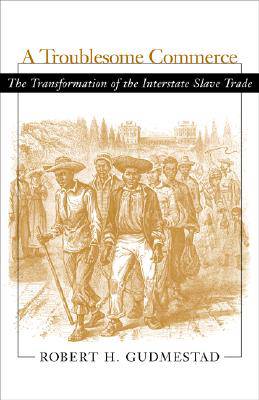
- Afhalen na 1 uur in een winkel met voorraad
- Gratis thuislevering in België vanaf € 30
- Ruim aanbod met 7 miljoen producten
- Afhalen na 1 uur in een winkel met voorraad
- Gratis thuislevering in België vanaf € 30
- Ruim aanbod met 7 miljoen producten
Zoeken
Troublesome Commerce
The Transformation of the Interstate Slave Trade
Robert H Gudmestad
Paperback | Engels
€ 45,95
+ 91 punten
Omschrijving
Robert H. Gudmestad provides an in-depth examination of the growth and development of the interstate slave trade during the early nineteenth century, using the business as a means to explore economic change, the culture of honor, master-slave relationships, and the justification of slavery in the antebellum South. Gudmestad demonstrates how southerners, faced with the incongruity of maintaining their paternalistic beliefs about slavery even while capitalistically exploiting their slaves, coped by disassociating themselves from the brutality and greed of the slave trade and shifting responsibility for slavery's realities to the speculators. In tracing the trans- formation of a troublesome commerce into a southern scapegoat, this pro- vocative work proves the interstate slave trade to be vital to the making--and understanding--of the paradoxical antebellum South.
Specificaties
Betrokkenen
- Auteur(s):
- Uitgeverij:
Inhoud
- Aantal bladzijden:
- 262
- Taal:
- Engels
Eigenschappen
- Productcode (EAN):
- 9780807129227
- Verschijningsdatum:
- 7/11/2003
- Uitvoering:
- Paperback
- Formaat:
- Trade paperback (VS)
- Afmetingen:
- 154 mm x 220 mm
- Gewicht:
- 390 g

Alleen bij Standaard Boekhandel
+ 91 punten op je klantenkaart van Standaard Boekhandel
Beoordelingen
We publiceren alleen reviews die voldoen aan de voorwaarden voor reviews. Bekijk onze voorwaarden voor reviews.











